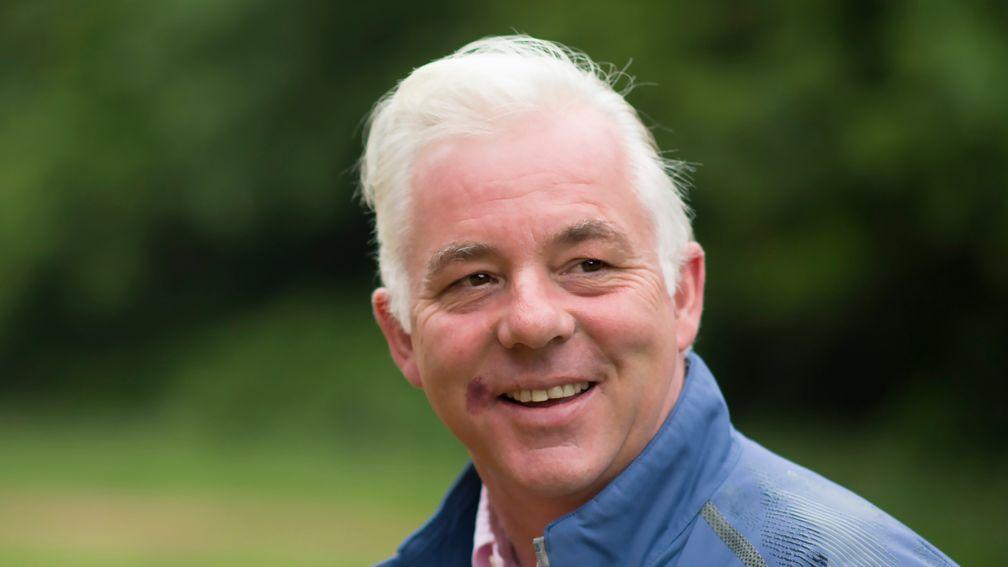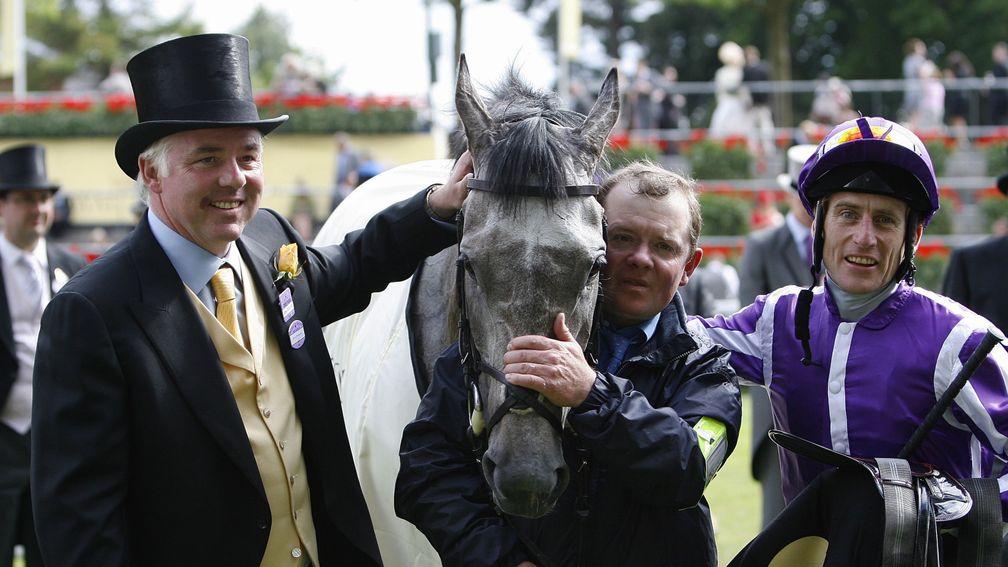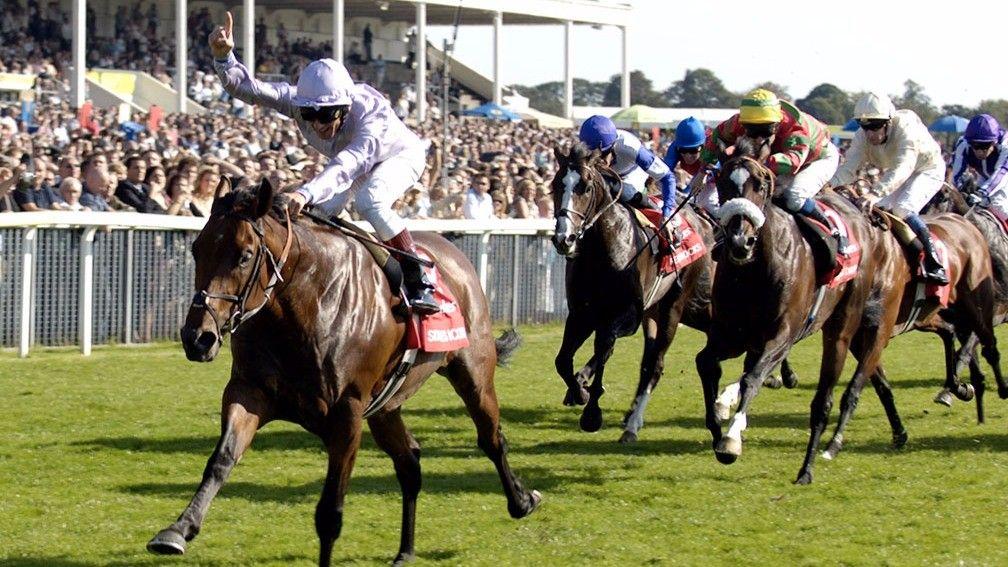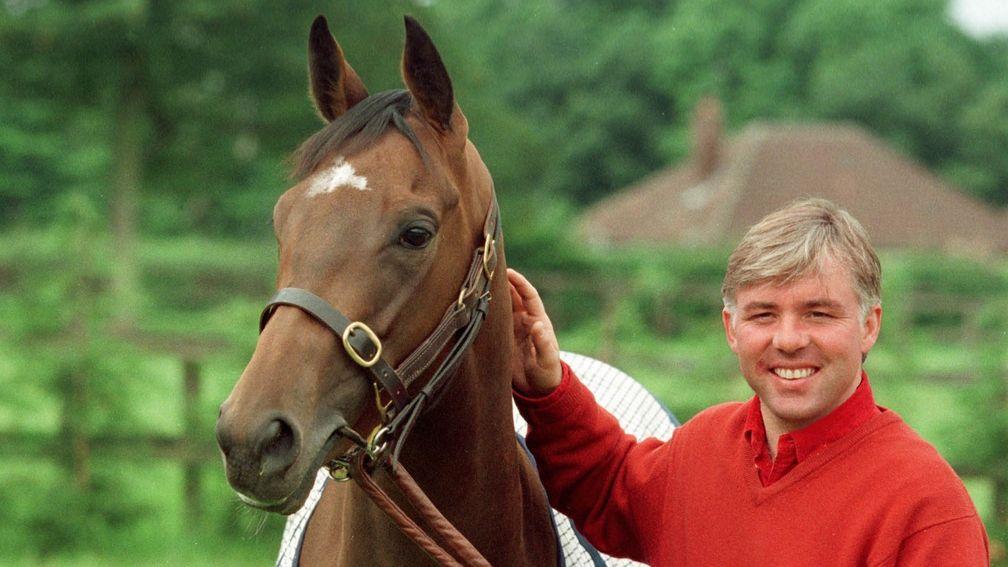'This is my work, my business, and I'm 100 per cent focused on it'
Peter Thomas talks to Jeremy Noseda, a man fuelled by self-confidence

First published July 4, 2010
I'm standing in the downstairs convenience at Jeremy Noseda's house, minding my own business, idly scanning the pictures and the paraphernalia, noting the two unthumbed volumes of Passing Time in the Loo, when I catch a glimpse of the kind of sight that could easily make a nervous man ruin a good pair of suede shoes.
There, lurking over my left shoulder, on the uneasy fringe of my peripheral vision, is a forbidding snap of the master of Shalfleet Stables, quite possibly standing on one Newmarket gallop or another, unmistakably proffering two aggressive, upraised fingers to person or persons unknown.
It's the kind of image that allows little scope for misinterpretation. The meaningfully contorted face, the pugnacious body language and the belligerent Harvey Smith salute are most certainly not an invitation to afternoon tea, the recipient unlikely to be a bosom buddy.
I emerge, a little timidly, from the cloakroom, having decided to broach the subject. "That picture," I begin.
"Pressman," he replies, almost unnecessarily, but with admirable powers of anticipation and what seems to be the first hint of a smile.
This is familiar territory for Noseda. With a few notable exceptions, he doesn't like the press and the press is quite prepared to reciprocate, having regularly been on the receiving end of his ire. But it's not just the press. To the racing public, he remains something of a mystery, and even those training colleagues who claim to be friends and admirers of the silver-haired 46-year-old will often suffix their praise of him with phrases along the lines of "but I just wish he'd learn to lighten up a bit". Enemies, no doubt, will be less charitable.
I had never met Noseda before. I've often sat in my car beside Warren Hill of a morning, waiting for a sighting of him not either talking intently on his mobile phone or wearing an expression that suggests he's just received news of the death of a beloved but penniless great aunt, but such a sighting has never occurred. I've finally pursued him, however, and he's eventually relented, and here I am, in the kitchen, chatting to what appears to be a perfectly genial soul, albeit one with a core intensity that seems never to sleep.
He's made me a cup of tea and we're discussing the World Cup, his passion for football, his noisy 15-month-old twin sons, his wife, Sally, his black Labradors and the recent Royal Ascot triumph of the not-unbacked Laddies Poker Two, when an unheard bell rings in head, the teacup is abandoned and we're off on the morning's manoeuvres. In the covered ride, the man in the pink, short-sleeved shirt and the pale blue jeans dishes out instructions in the forthright, measured tones of a boss who is used to being heard and understood.

"Two up the short Poly. Away you go. Two up the short Poly. Away you go," he intones as the string files out into the sunshine, punctuating every polite order with an authoritative, definitive chop of the hand.
From Warren Hill to the Limekilns and back and forth and to and fro we trek in the trainer's smart new Range Rover. He apologises for his operation lacking the military precision of a morning with Sir Mark Prescott, but the result is similar – a gruelling, necessarily frantic dash to satisfy the unrelenting demands of perfectionism.
On the training grounds, riders are intercepted, gently interrogated, reinstructed and sent on their way with a parting "Yeah?" that falls somewhere between a polite inquiry and an implied threat, just to be sure they've been listening and understanding, which they invariably have. Back in the yard, long-serving staff revolve naturally around Noseda, drawn in by his gravity, receiving credit where it's due and exasperation when it's not.
"The bitless bridle!" he barks at a transgressor. "No, the bitless bridle!! Oh, I hate people who don't listen!"
So, what's not to like about Jeremy Noseda? And why doesn't he like us? On the evidence of one busy morning, he's a thoroughly professional, seriously communicative, wholly amenable human being who has rather too much on his plate to be constantly engaging in the niceties of polite conversation. Those who bear the scars of his intolerance, however, may beg to differ. Where owners get chapter, verse and lashings of courtesy, fellow trainers may get less than they bargained for and the inquiring hack is just as likely to receive a big, angry flea in his ear. Why can't he just lighten up?
"This is my work," he says, unapologetically. "I know in the big picture of the world it's a triviality, but this is my business, I'm 100 per cent focused on it and when I go out and train those horses, most of the time it will just be me, my horses and my thoughts. I don't want other people round me.
"The only calls I take are from my owners and from Michael Haggas, my form man. I don't socialise with other trainers, I don't go to dinner with them or with bloodstock agents. My racing is my job, I love it, but once I occasionally step aside from it, the things I love to do take me away from racing. I'd much rather sit down with some of my owners and talk about football, go to matches in the winter, maybe visit my wine merchant for a tasting, and I love art.
"With the press, it's as much my fault as it is theirs. I know I can be as stubborn as a mule, but they've upset me and I find it hard to forget that. They're as keen to write a poor story as a good story, to scratch around for things that don't really matter, to hound me about things that aren't their business, to dismiss a good race as bad.
"Friends curse me for being the way I am, because they say it isn't really me and now I'm being portrayed as someone I'm not. But I suppose I struggle to let it go, to leave it be, and when all's said and done, my loyalties are 100 per cent to my owners and what I do for them, then to the people that work for me, and then there's everyone else. So, people in racing don't see another side of me. Or perhaps I'm just using that as an excuse."

Taken regularly to watch Chelsea home games – complete with the obligatory orange box to stand on – the youngster nonetheless ended up a Spurs fan and then transferred his affections, lock, stock and barrel to racing after becoming enthralled by the televised exploits of Nijinsky in the early 1970s and taken to the races by a father keen to indulge his son's enthusiasm.
By the age of 15, however, he'd never been within patting distance of a racehorse, and his first tangible contact with the sport came when he was taught to ride by 'the Queen Mother's jockey' David Mould, whose family were fellow Londoners, after which he combined working in the holidays for Epsom trainer Brian Swift with earning the academic qualifications that would have sent him to Cambridge University, had he not opted to pursue a career in racing. It was a rarely trodden path that led him to his destiny, but one along which he was guided by parents who made sure he wouldn't waste such opportunities as came his way.
"They didn't start out with much," he remembers, "and they wanted me to have the chances in life they didn't have. They were working people who, through hard work and endeavour, made themselves successful. Their unselfishness gave me the most spectacular education and I worked bloody hard, as well. I had the chance to go on and study law, but by then I was besotted with racing and I couldn't imagine doing anything else."
Noseda took his first steps on the Turf with the late Jeremy Tree, but the meat of his education started with John Dunlop, for whom he served a four-year apprenticeship until the great man packed him off to learn at the feet of John Gosden in the US. Returning much the wiser to Blighty, he spent another four years with Dunlop as assistant trainer, before turning up like a bad penny on Gosden's doorstep to fill the same role for five years.
News of Noseda's burgeoning expertise began to spread, even as far as Dubai, where Sheikh Mohammed heeded the word and summoned the rising star to be a linchpin of what would soon become Godolphin.
There followed an exciting and sustained honeymoon period, during which horses like Balanchine, Lammtarra, Moonshell, Halling and Red Bishop racked up Group 1s by the hatful, followed by a messy divorce that is still plainly, sometimes painfully, under Noseda's skin.
"It ended in tears," he says, briefly and bluntly, "but it was a great springboard for a young man, and I have no regrets. It gave me a propulsion into this business that I couldn't have got from being an assistant trainer, and it helped me set up on my own in California, but all the time I was there, I missed home. I love English racing and I thought there was no point channelling all this energy into America when all I wanted to do was get home and start again."
Noseda came back, bought Shalfleet, on Newmarket's Bury Road, and set about the task of maximising talent such as his 1998 Cheveley Park heroine Wannabe Grand, through his first Classic winner Araafa (2006 Irish 2,000 Guineas), all the way to his first British Classic winner Sixties Icon (2006 St Leger) and last year's July Cup winner Fleeting Spirit, whom he sees as having a solid chance of repeating the dose on Friday.

Some would say he's arrived, Noseda would probably tell you he's only halfway there. Certainly, there's no sense that he feels any abiding contentment at his achievements or satisfaction at his status. Horse numbers are holding steady at around the 100 mark, in the face of hard times, but each new campaign is marked by the same feeling, the need to do his utmost with the bloodstock at his disposal, regardless of the level each individual may realistically aspire to. He sets seasonal targets that challenge to an almost masochistic degree and can define his mood for the rest of the year. Success merely heightens the need for success; failure is abject.
"Every April, I'll write a list of horses who could be Group horses," he explains. "I work out how many Group races I think I should win, whether I should win a Group 1, how many winners I think I should have, and I keep it in my top drawer.
"My targets are realistic but I set them to try to over-achieve with what I've got, so in a year like this, when it's a grind, it can be frustrating, but you have to go through that grind so that at the end of the season you can say you've done a bloody good job, you've achieved what was in your grasp to achieve. If I don't do that, I start to question myself. I have a fear of not doing it. Maybe that's why I find it hard to lighten up.
"In my mind, it's the constant pursuit of the one horse who can brighten up your morning. If that special horse doesn't come, then I'll just say the opportunity never came my way, but if that horse arrives in my hands and I make a mess of it and don't make it happen, then I'll be upset with myself.
"Yes, Jeremy Noseda Racing has to stand on its own two feet, but I'm not motivated by money, I'm motivated by achievement. I wouldn't care if a Group race was worth fifty quid, I'd still want to win it."
He's not an overly demonstrative man, but it doesn't take long, in the thick of a season he regards as "a disappointment", to get past the football, the wine and the art to the biggest love of his life: the challenge that can be risen to and met.
It can be Soldier's Tale, the brave beast who overcame three fractured legs and two bouts of colic, escaping being put down by a matter of minutes, to win a Golden Jubilee at the age of six. It can be Laddies Poker Two, nursed back from recurrent injuries to win the Wokingham off a 610-day break. It can be any horse at all, but it can't end in failure.
"On most occasions, a good horse makes a trainer's life very easy," he says, "in the same way that Lionel Messi makes Pep Guardiola's life easy, but the best job I do every year will be winning a maiden with a horse that didn't have any right to win it, not going to a big meeting and winning a Group race with a horse who was the best in the race, who was going to win if I kept him fit and healthy."
Even when the job has been done, however, you won't find Noseda basking in reflected glory. Having returned from a jubilant afternoon at Royal Ascot, there was no vintage champagne waiting on ice and no slap-up meal with admiring friends. "I came back, took my dogs out for a walk, had a Kentucky Fried Chicken and sat down and watched the football," he admits.
"It sounds bloody awful, but I don't want to celebrate, because with a good winner comes a huge element of relief and I just want to sit down and say: 'Phew, thank God for that.'
"I never doubt my ability, but I went into Ascot feeling like a prizefighter who'd gone the first five rounds of a title fight and lost every one on points. I feel we landed a good blow that let everybody know we're still around, but now there are ten more rounds to go and I've got to win a lot of them to get myself where, with the kind of horses I've got, I should be."
It's a volatile mixture of self-confidence, undisputed talent and fear of failure that fuels Jeremy Noseda. He's sure he's right but he knows he could be wrong, and it bothers him sometimes. So, if you look over your shoulder one day and see him giving you a heartfelt V-sign, don't take it personally – it's all in a day's work.
Did you know you can bet via the Racing Post mobile app/website? Simply sign in with your favourite bookmaker via the Accounts button and then bet direct from our racecards
Published on inNews
Last updated
- Join Racing Post Members' Club for the very best in racing journalism - including Patrick Mullins' unmissable trip to see Gordon Elliott
- Join the same team as Ryan Moore, Harry Cobden and other top jockeys with 50% off Racing Post Members' Club
- Racing Post Members' Club: 50% off your first three months
- 'It’s really exciting we can connect Wentworth's story to Stubbs' - last chance to catch master painter's homecoming
- The jumps season is getting into full swing - and now is the perfect time to join Racing Post Members' Club with 50% off
- Join Racing Post Members' Club for the very best in racing journalism - including Patrick Mullins' unmissable trip to see Gordon Elliott
- Join the same team as Ryan Moore, Harry Cobden and other top jockeys with 50% off Racing Post Members' Club
- Racing Post Members' Club: 50% off your first three months
- 'It’s really exciting we can connect Wentworth's story to Stubbs' - last chance to catch master painter's homecoming
- The jumps season is getting into full swing - and now is the perfect time to join Racing Post Members' Club with 50% off